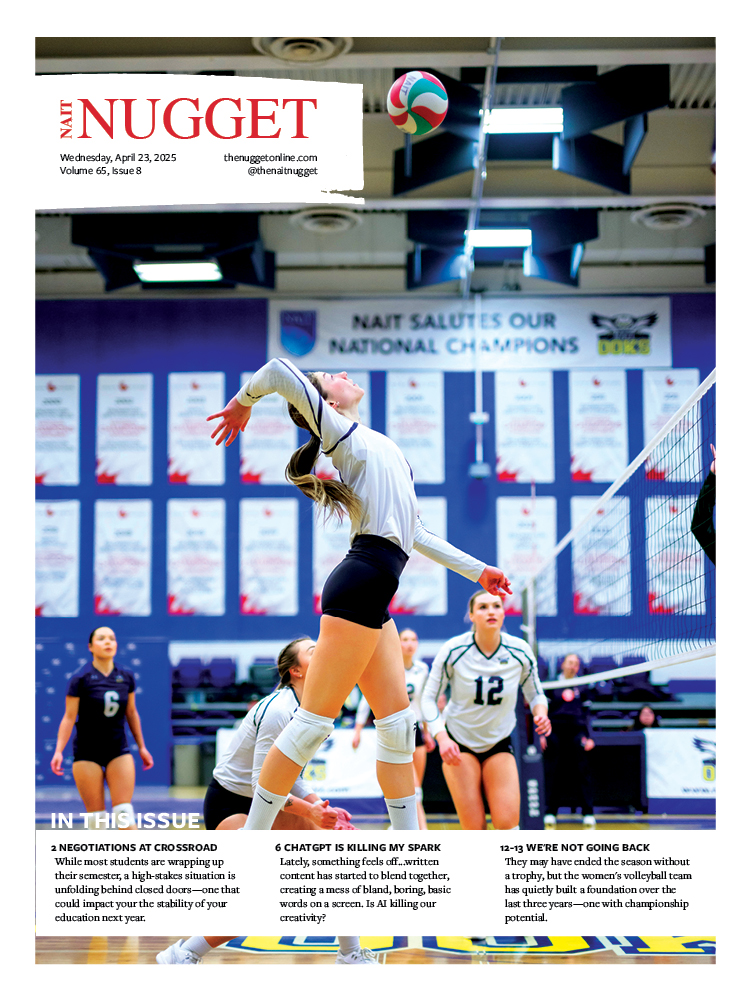I wanted to finish a chapter of my investing course by reading it off my mobile. Instead, I finished three seasons of Friends in YouTube shorts, and I thought to myself: ‘Could studies BE any more distracting?’
In high school, back in my home country, I always used physical textbooks for courses. There was a strict no-device policy during classes, and it was always fun to see how a teacher would react to finding a student using a mobile in class. Most of the assignments and coursework were on paper. So, shifting to e-textbooks now that I’m at NAIT was a bit of an adaptation. It’s not that I haven’t used laptops or mobiles before, I just haven’t used them primarily for reading and studying. Now I am expected to stare at a screen for 10 hours a day… didn’t screen addiction used to be a thing?
One thing I like about e-textbooks is the audiobook feature embedded in many of them. It allows for multitasking. I usually do all my readings while traveling and it works well for time management.
I tend to multitask (also known as messing up more than one thing at once) so another positive to no longer using physical books? I was a messy student. Whenever I studied, I was buried in books. One time I almost suffocated to death, true story. I saw some How I Met Your Mother too.
In my mom’s words, my methods of studying were the purest depiction of chaos. Now, that chaotic dance is performed by my laptop in the form of 50 tabs in 20 windows. Some days when I am writing a research piece and doing my homework, you can hear my laptop crying.
And it doesn’t end. I have two jobs that are both primarily staring at a desktop screen. After reading books through a screen all day. By the end of some days, I go a little blind, only to regain my sight and be blinded the next day once again. The sheer irony of this situation is that you are reading this article on a screen.
This Friends incident is just the most recent instance. I have noticed that my span of being able to actively study has reduced with YouTube a tab away. I constantly have to remind myself what I was supposed to do on the screen.
So how did we get here? I did some digging on Google. That’s all the ‘original’ research I can do and found that it’s the publishers that have been pushing digital versions of textbooks books left and right. The market has just been pivoting to this push. I think it’s obvious that the margin on e-textbooks is much, much higher than printed paperbacks.
It would have been nice if some of these profits were given back by making physical textbooks more affordable, but I digress.
I might get booed for this but, while I appreciate the effort of publishers in the good name of sustainability (even though their sustainability is a different kind of green), what I don’t appreciate is the tricks to make specific books compulsory for courses.
Education is not meant to be acquired by a specific text.
As long as students are able to answer the curriculum, it shouldn’t matter where they learned from: the textbook, read it off the internet or were born with the divine knowledge. The important thing is that they know what they are supposed to know.
And, when knowledge degrades or you need a refresher, you can’t even access e-textbooks again. I still sometimes refer back to my middle school books. But in most cases, e-textbooks that often expire a day after the semester ends, making them just as useful as the retention span of the person using them. Mine’s not great, what about yours?
Believe me, I can debate on this topic for days and days. I haven’t even gotten into how access codes for 20 or 30 per cent of grades are just a sustainable face of exploitation, but my battery is dying.






